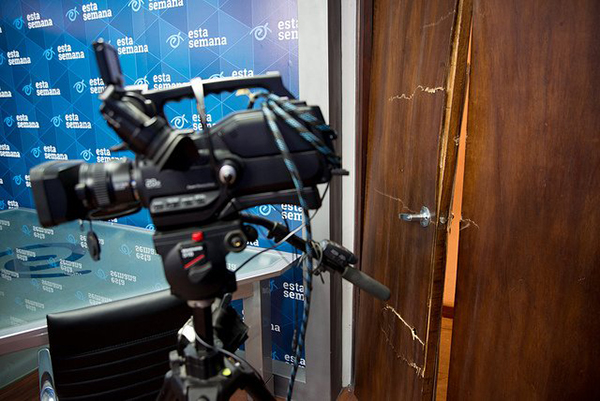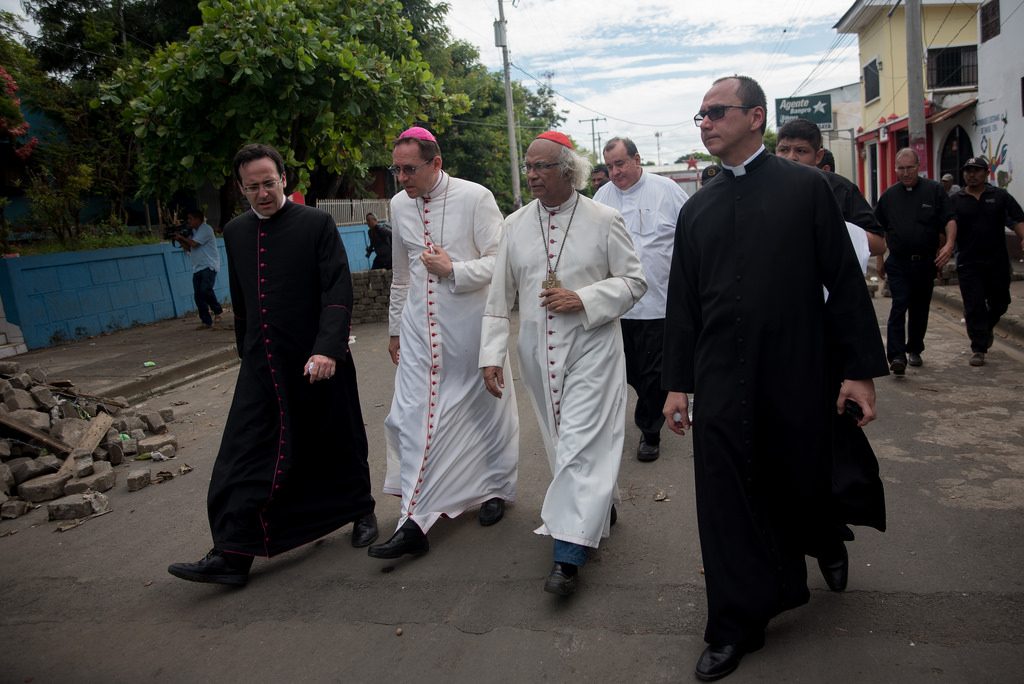I write this article in times of overwhelming uncertainty for the Nicaraguan society. It cannot be overlooked, because of the parallel with the equally serious Venezuelan crisis. Both issues are fundamental for the bipartisan agenda that should guide foreign policy in the U.S.
The 2018 protests
On April 18, 2018, the day that the series of protests began in León and Managua, a process began that could either culminate with the end of the regime of Daniel Ortega and Rosario Murillo or, on the contrary, lead to an open dictatorship, based on the control of the public powers, the army, the police forces, and the military groups.
The next day, the protests spread through several sectors. The government mobilized its followers, which caused clashes. Consequently, three people were killed; in the days and weeks that followed several other tens joined that statistic. The government’s first reaction was to condemn the violence that, to some extent, it had led. Ángel Gahona died on the 21st, murdered in Bluefields while reporting the news. Narrating everything that has happened since then would require numerous tomes.
As the protests continued, the complaints from the human rights organizations multiplied. The Episcopal Conference promoted dialogue, while demanding the end of repression and the dismantling of paramilitary groups. After the dialogue was broken, on May 23rd, the government began a campaign, which has not stopped yet, to denounce the protests as part of a route towards a coup d’état. Under that pretext, the repressive action of the government has reached extremes that nobody had foreseen. There have been verbal and physical attacks against the Church authorities, as well as walkouts and two national strikes. In a raid on the National Autonomous University of Nicaragua facilities, two students were murdered in a confrontation between the police and paramilitaries. The victims’ denunciations included an aspect that cannot be omitted: there were Cubans and Venezuelans among the executors of the repression.
Despite the UN and the OAS categorical condemnations, the government has responded with more repression and with measures, for example, such as the expulsion of the United Nations High Commissioner for Human Rights, the Inter-American Commission on Human Rights, and the Interdisciplinary Group of Independent Experts. In the latter case, the measure was taken just the day before the scheduled date to present the investigation report. In it, as it became known later, it was established that crimes against humanity were committed. A recurrent theme in countries where it is the State that shoots, it is still difficult to count the number of fatalities. This explains why NGOs, media, and international organizations have reported different figures. There are reports of “disappearance” of corpses; though it remains unknown precisely how many Nicaraguans have fled to Costa Rica and other countries. The truth is that, until now, there are approximations that speak of 350, 480 and even 600 people killed. The statistic that appears duly substantiated indicates that 235 people were murdered in the streets during the protests, 33 of which were police officers.

Attacks against the media
The chapter dedicated to attacks against journalists and media is bulky and is, still now, in development. An emblematic case was set in motion the night of last December 13th. The offices of the digital newspaper Confidencial were illegally raided, its property stolen, and partially destroyed. Carlos Chamorro Barrios, its director, who also runs two television programs of information and opinion, “Tonight”—daily—and “This week”—once a week—made the complaints to the authorities, which did nothing. The threats against Chamorro Barrios forced him to go into exile in Costa Rica on January 20th. A week later, his program “This week” was taken off the air.
This fact is revealing because of the multiple implications it has. Pedro Joaquín Chamorro, his father, was a journalist, writer, businessman, and director of La Prensa (1926), the oldest and most important newspaper in Nicaragua. On January 10, 1978, Pedro was assassinated for fighting against the Anastasio Somoza dictatorship. His death has been inscribed in contemporary history as the milestone that marks the beginning of the end of the dictatorship. The now persecuted Carlos Chamorro Barrios was director of the Barricada newspaper, of the Sandinista National Liberation Front (FSLN, Daniel Ortega’s political party). His mother, Violeta Barrios de Chamorro, was president of Nicaragua between 1990 and 1996.
Violeta Barrios de Chamorro succeeded Daniel Ortega’s first mandate, amid risks and tensions of extraordinary complexity with Sandinismo, which continued to hold a lot of power, including nothing less than the control of the armed forces. Persuaded by Doña Violeta, Humberto Ortega, brother of Daniel Ortega, continued at the head of the Ministry of Defense and began a process of reduction, institutionalization, and professionalization of the same. Something else worth highlighting now is that for half of his mother’s term, Carlos Chamorro Barrios continued directing Barricada.
Violeta Chamorro’s six-year presidency continues to be a reference for democrats in Nicaragua and around the world. During the two wars that had preceded it—that of the guerrilla forces against the Somoza regime, followed by that of the so-called ‘Contra’ against the FSLN—, between 66 and 68 thousand Nicaraguans died. The process of reconciliation began under the presidency of Doña Violeta. Foundations were laid for a democracy based on the separation of powers, freedom of expression guarantees were established, properties that had been expropriated were returned, fundamental steps were taken for economic recovery, and, as captured by images that traveled the world, thousands and thousands of weapons were destroyed.

This recapitulation is useful to show how the regime of Daniel Ortega and Rosario Murillo has not only acted against those who were fundamental allies—such as the emblematic case of the journalist Carlos Barrios Chamorro—but, even worse, also destroyed the bases of a democracy, in which groups that had once fought against each other with arms now coexisted. It is no exaggeration to affirm the establishment of a dictatorship of a police, military, and family nature; and the return to a polarized society dominated by violence.
Blurred lines between public powers
Ortega and Murillo have resorted to qualifying the spontaneous protests that took place throughout the country, which were followed by denunciations and pronouncements from practically every organized sector of society, as an attempted coup d’état. This accusation has been the excuse to unleash a systematic program of repression and destruction of liberties. However, the facts dismantle such a lie. Similarly, relevant figures have denied the regime’s claim, such as Rafael Solís, former magistrate to the Supreme Court of Justice of Nicaragua and one of the fundamental men of the political and institutional framework controlled by the FSLN, who resigned on January 10th with a public letter sent from Costa Rica.
To the denunciations of citizens, political parties, media, business associations, trade unions, the Catholic Church, universities, and, very importantly, of human rights defenders, the regime has responded with threats, raids, destruction of offices, arrests, attacks by paramilitary groups, trials, and expulsions. It has turned a substantive part of Nicaraguan society into de facto enemies. Since April 2018, without any scruples, Ortega and Murillo have exhibited—similar to the Venezuelan situation—a power that has alliances with criminal gangs, to punish opponents. The expulsion of the High Commission on Human Rights of the UN, the Inter-American Commission on Human Rights, and the Interdisciplinary Group of Independent Experts (GIEI), or the arrests of journalists Miguel Mora and Lucía Pinedo, confirm that legal security, institutions, due processes, and fundamental guarantees of citizens have been violated. In fact, there are ongoing cases in the International Criminal Court that demonstrate the government forces deliberately committed the crimes.
The messages and signals issued by the government so far still showing little willingness to participate in an effective a dialogue and political negotiation that represents a new horizon for Nicaragua. It is fundamental to understand that in this system the FSLN, the State, and the couple Ortega and Murillo, are intertwined to the point each of them completely loses its democratic identity. The State and military and paramilitary forces respond to the concentrated and implacable power of the couple and its relatives.
Ligia Ivette Gómez, the former official of the Central Bank of Nicaragua, described, from her exile in the United States, how much the lines have been blurred. On September 27, 2018, before the Tom Lantos Human Rights Commission—chaired by James McGovern, senator of the Democratic Party—, Gómez showed how the leadership dictates orders, exercises control of each piece of the State structure, threatens the officials, elaborates lists of enemies or dissidents, forces them to mobilize, and, when they resist, they are harassed, isolated, dismissed, and even imprisoned.
Dialogues between the opposition and regime
A terrible prognosis: there are Nicaraguan leaders who have warned that, if things continue under current trends, the risks of new deadly clashes could be unleashed at any moment. There are those who have spoken of a potential civil war, in a nation where political violence has been reiterated. With a divided and disarticulated democratic opposition, more than 500 political prisoners, and a government occupied in persecuting and killing, the urgent and irreplaceable need for a dialogue looks, in the immediate term, uncertain.

On March 5th, the news about the outcomes of the fourth day of negotiations between the government and opposition are not encouraging. The Catholic Church announced its withdrawal from the sessions, considering that their presence in them is not essential. In addition, according to a spokesperson for the Church, they have not received an invitation from the parties to act as mediators. According to the summary published by the newspaper La Prensa, until Monday the 4th it had not been possible to define the content of the bases, whose main difficulty is to agree on the role that the witnesses and companions of the negotiations will have. Ortega insists that the bishops, the OAS, and the UN should not participate in the dialogues.
In the years 2016 and 2017, the economy growth was 4.7 and 4.5, respectively. Then, the violence had consequences: the GDP fell 4 points in 2018 and the expectations for 2019 range between bad, very bad, and terrible. Some projections state that poverty, which affects more than a third of the population, is growing again. When comparing the agricultural productivity rates of Nicaragua with that of Guatemala and Honduras, for example, the concerns are justified, in a country where half of the population is under 25 years old. Construction, tourism, and commerce activities have collapsed. The flight of capital is alarming. As are fears regarding the possible unemployment growth. The World Bank has said, recently, that the country’s situation could worsen in the coming months. And the government itself has issued a communication asking Nicaraguan society to prepare for worse times, which reiterates that, in the immediate future, they do not want to give in.
The polls indicate that the FSLN and Orteguismo still maintain a non-negligible support of 30%. But, on the other side, almost 70% reject it and 54% want early elections. The tasks that await Nicaragua are more foundational than corrective in nature. There needs to be an agreement that begins with an electoral reform. The era of changes would not have the necessary legitimacy unless they are the result of an electoral process. The extreme politicization of the judiciary encourages qualified people to demand a broader reform, of a constitutional nature, to establish the separation of public powers. The institutional recovery should include the armed forces, which are obliged to face the disarmament of the paramilitary groups. Otherwise, recovering peace in the next few years will be impossible.
Para español lea El Nacional Debates Latinos: Nicaragua
Nos leemos por twitter @lecumberry
Images: Twitter @confidencial_ni
